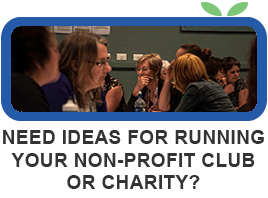Last updated June 2, 2017
Volunteer recognition is an important part of any volunteer programme, but there’s more to recognising your volunteers than printing their name in the newsletter. Genuine recognition requires you to think about each volunteer and the specific contribution they have made to your organisation. You need to consider the impact their volunteering has had on your organisation’s mission and consider appropriate ways to recognise that level of commitment. While every volunteer should be recognised, not all volunteers need to be recognised in the same way. Check out these five good ideas for recognising volunteers:
1. Honours Board
Create an Honours Board that you can hang in a prominent position at your organisations office, clubrooms or centre. Each year select one volunteer who has made a significant contribution to your organisation and have their name added to the board as ‘Volunteer of the Year’.
Remember there is more to a great volunteer than the number of hours they have worked, so make sure that the selection is based on a wide range of criteria. You could include measures such as commitment to on-going training, support given to other volunteers and contribution to a positive working environment. Create a special awards ceremony to unveil the updated Honours Board each year or make it a cherished part of your organisations Christmas Party.
2. Recognition Garden
The planting of trees has long been used as a way to remember people, but it is equally appropriate to use trees or plants as a way of recognising a volunteer’s contribution. Create a garden where you can establish appropriate trees or plants in recognition of long service volunteers. You could choose the volunteers favourite flower or perhaps a plant that illustrates their personality. There may well be a plant that reminds others of a particular story or event related to the volunteer’s contribution. At the base of the plant, include a plaque recognising the volunteer.
3. Service Badges
Many schools use the system of service badges to recognise students who have taken up leadership positions or achieved outstanding results in particular fields. Those who have had their achievements recognised proudly wear their badges for all to see, and it gives other students something to strive for.
A similar system could be introduced for your volunteers, with badges made available for various achievements. You may like to have badges for years of service, hours contributed, positions held, trainings attended, or something else that is specific to your organisation. Keep in mind that for volunteers to feel their efforts have been genuinely recognised, badges should be reserved for achievements and contributions that have required considerable commitment.
4. Anniversary Cards or Certificates
If you have a formal induction process for your volunteers, you will have a record of when each person began their volunteer journey with your organisation. (If you don’t, start taking note from now on.) Each year, on the anniversary of their involvement, send your volunteers a card or a certificate recognising another year of contribution.
5. Combined Hour Glass
A fun way to recognise the combined efforts of your volunteers is to construct a giant hour glass illustrating the total number of hours contributed during the year. Much like a ‘fundraising thermometer’, the hour glass fills with sand as each volunteer hour is worked.
If you have a creative and resourceful team member, you could create a 3D hour glass where marbles are added for every hour contributed, or you could keep it simple and paint the illustration on a giant board. A simple Google Image search for ‘Hour Glass’ gives you lots of templates to use.
To ensure the hour glass is an accurate reflection of your volunteer contributions, you need to have a good system in place for recording volunteer hours. Make sure the hour glass is displayed somewhere prominent and updated regularly so your whole team receives the recognition they deserve.
Kerri Tilby-Price
Kerri is a Facilitator / Trainer with Exult and has over 20 years experience working in and for the community sector.
If you think this article would be useful for your members, you are welcome to use it on your website or in your newsletter. We just ask that you let us know where it is being used, and that you acknowledge our website at the bottom of the article. If you are using the article online, please include a link to our homepage.





how can i find out more about engaging with volunteers, maintaining relationships, sharing responsibility, the whole world of volunteership is something that we are struggling to manage, trust, develop, inform etc……..
Hi Wiremu,
you might want to check out our Growing Great Volunteer Teams workshop that we run all around the country. Make sure you are signed up to our newsletter, so that you know when it’s happening in your town.
Kerri